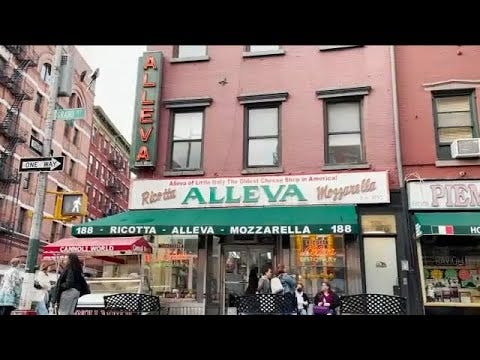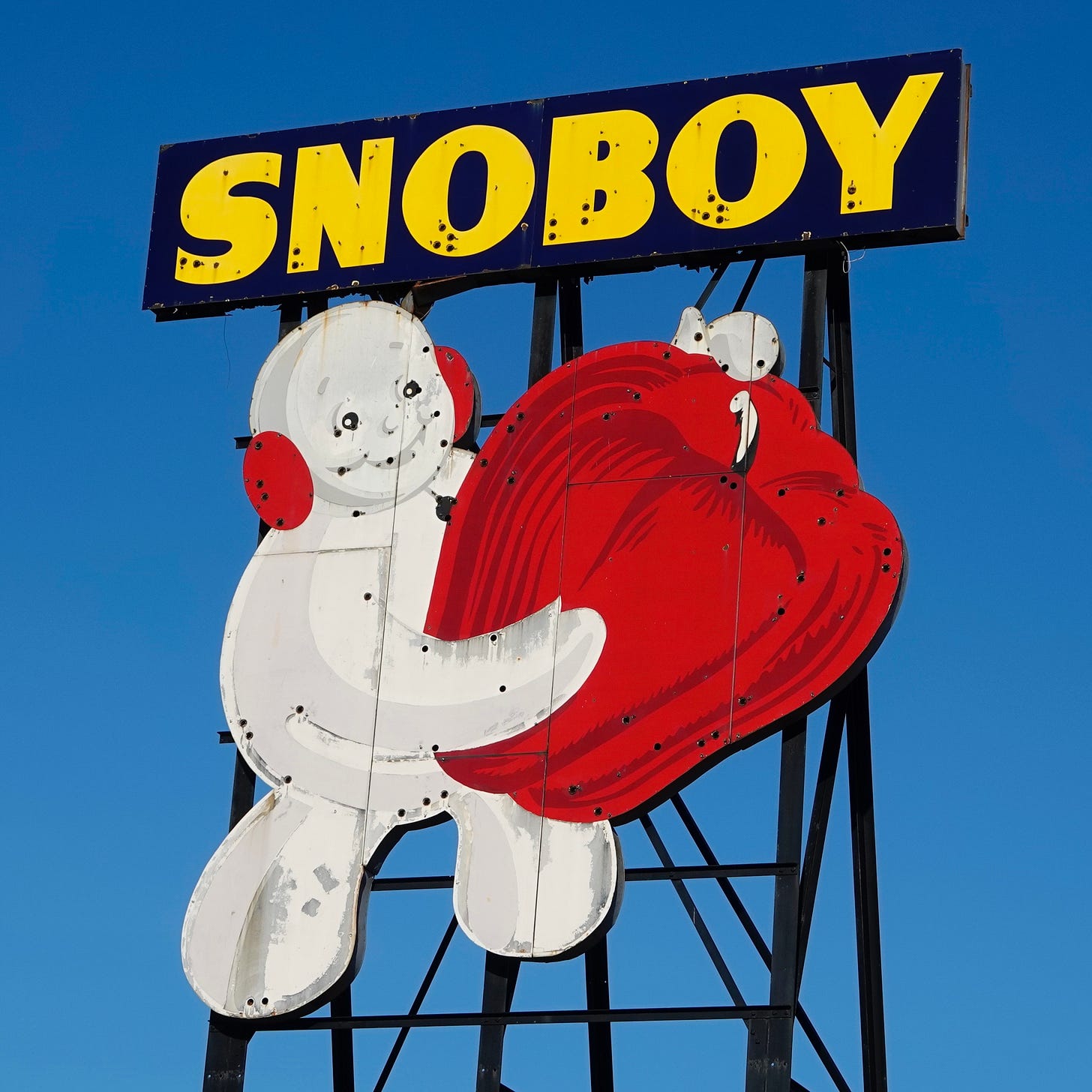Breaking: Alleva Dairy, billed as America's oldest cheese shop, closes after 130 years
Plus, The Retrologist introduces you to Minneapolis' beloved Snoboy sign and updates you on a Lincoln Highway motel that could be endangered. Plus, a dozen more roadside headlines
At 6 p.m. tonight, March 1, 2023, Alleva Dairy in Manhattan’s Little Italy closed after 130 years.
Crippled by the pandemic and over a half million dollars behind in rent, Alleva sparred with its landlord while appealing to the public and media in a bid to stay open. The cheese shop, famed for its mozzarella and fresh ricotta, declared Chapter 11 bankruptcy in the fall, and a vigorous last-ditch effort to stay in business at the corner of Mulberry and Grand streets failed.


Today, the owner, Karen King, announced that the shop was closing in Little Italy, but like so many businesses (and people) priced out of the big city, Alleva is moving to the suburbs, New Jersey specifically, and settling into bigger digs at that.
King wrote in a news release:
Today marks a new chapter in the history of my beloved cheese store. Thanks to the vision, generosity and commitment of businessman and developer, Jack Morris, President and CEO, of Edgewood Properties, Alleva Dairy will be opening a 3700-square-foot store at 9 Polito Avenue in Lyndhurst, N.J.
There are not enough words to express my gratitude to Mr. Morris and his organization.
One thing is certain, Alleva Dairy will continue and will be bigger and better than before.”
Grazie,
Karen King, Alleva Dairy
In 2014, King and her husband, John “Cha Cha” Ciarcia, an alum of “The Sopranos” and an Alleva family relative, purchased what’s billed as America’s oldest cheese shop from the original Alleva family. Ciarcia died the next year. The actor Tony Danza — Ciarcia was once his boxing manager — also co-owned the cheese shop until 2017, according to the New York Times.
The business that Pina Alleva founded in 1892 will be planting itself in the Garden State, its departure another loss for Little Italy, which keeps getting smaller, at least the Italian part of it.
Sign in the Spotlight: Snoboy of Minneapolis
Back in July, I finally scored this bucket lister — the Snoboy sign in Minneapolis. And I meant business — I went back to photograph it twice. My first try was late in the afternoon, shortly after I arrived in town. I knew it would be a backlit mess, but I was so eager to see Snoboy for myself I had to go right away. The next day, I was back, bright and early, and captured the postcard-perfect shot I had long visualized in my mind: Snoboy set against a bright blue sky.
Even though I was eager to share Snoboy with you right away, I resolved to hold back on posting him until we got our first real snowstorm here in New York City, where I live. I figured Snoboy would make a nifty first snowfall post. I also figured, wrongly, that this day would come sometime in December, maybe late November if I was lucky. (I know many of you see any snow, early or late, as unlucky, but I traveled to Minneapolis to shoot a giant snow child, so you know where I stand on snow!)
Well, New York City finally got a slushy, sad little “storm” the other day, enough for me to justify trotting out Snoboy!
Snoboy is something of an orphaned sign but he’s hardly abandoned and is very much loved.
The adorable Snoboy brand was introduced in 1925, and traces it roots to a horse-drawn fruit-cart business in Tacoma, Washington, in the late 1800s. Snoboy was used on the label of Washington state apples that met certain standards — “picked for flavor,” as the company used to say. In the early 1940s, Snoboy’s parent company, Pacific Fruit and Produce Company of Seattle, merged with Minneapolis-based Gamble Robinson, to form Pacific Gamble Robinson, and Snoboy went from rainy Washington to snowy Minnesota, where it seems he belonged all along. Snoboy’s scaffold sign was erected in 1954 at the site of the former headquarters in Minneapolis, according to Snoboy’s official website. You can visit the sign here.
Above, enjoy two vintage commercials featuring Snoboy. My, his voice is rather deep for a boy!
The company for years was heralded as “the nation's largest wholesaler and distributor of fresh fruits and vegetables,” but the Snoboy brand is also consumer facing, and in the 1940s and ‘50s, Snoboy was at the center of many marketing campaigns. In the late 1940s, you could buy an inflatable Snoboy and even a Santa Snoboy — a $3 value yours for only $1! In the 1950s, coloring books were slipped into bags of Snoboy apples for kids to enter a contest with fancy prizes like electric-motor scale-model cars!
Hey, whatever it takes to get kids to eat healthy, right?
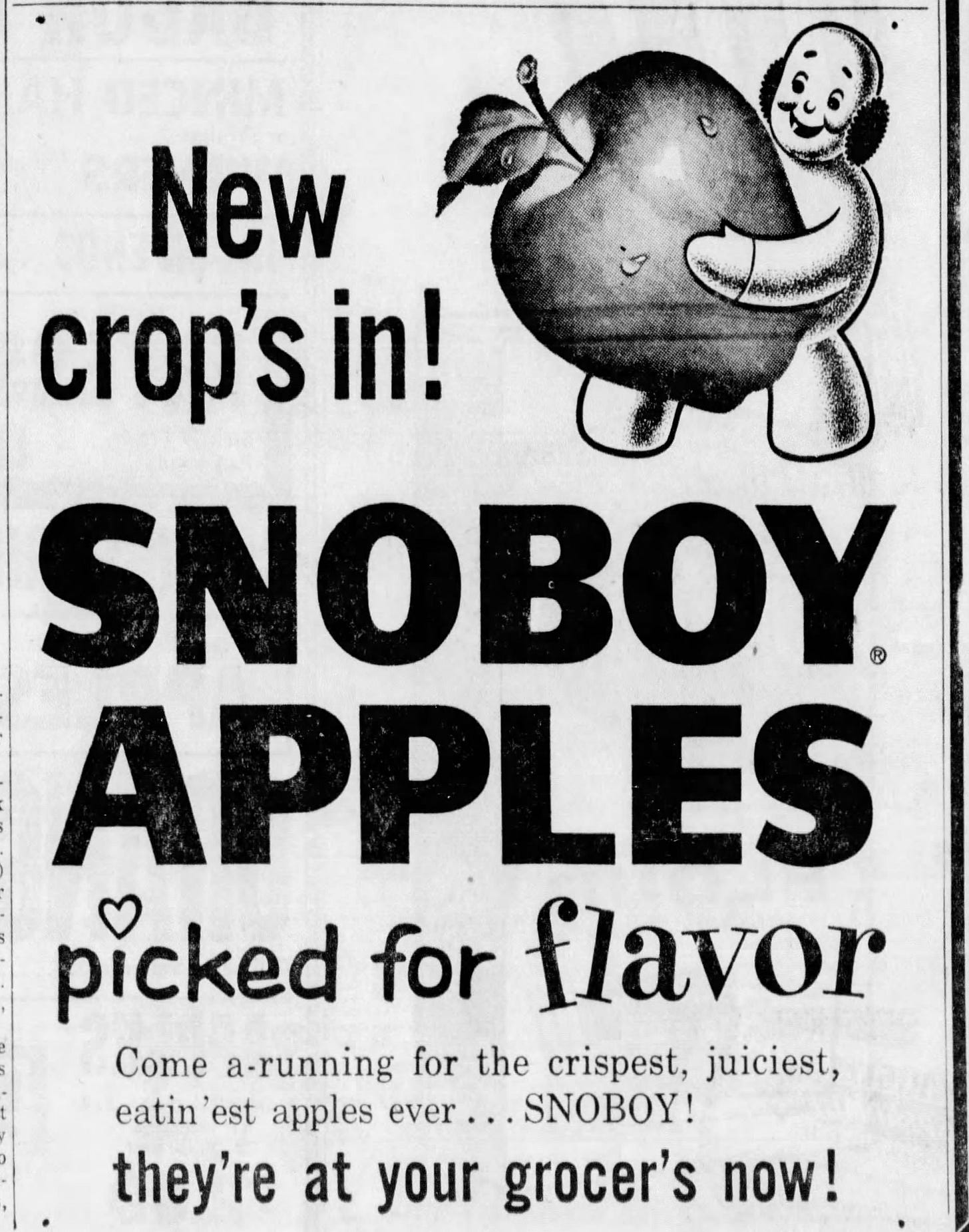
The Snoboy brand has not been abandoned by the successor company, Amerifresh, which uses him as a mascot for its line of produce, and features a whole website based around Snoboy.
Snoboy, far from melting, remains the familiar frosty face of the business. He may be 98, but he keeps up with the times. Just last year, the Snoboy character got a refresh, the second update in a decade, but he’s still his adorable old self, and still smiling from that scaffold sign in Minneapolis, proudly holding that giant apple.
Picked for flavor, in case you didn’t know!
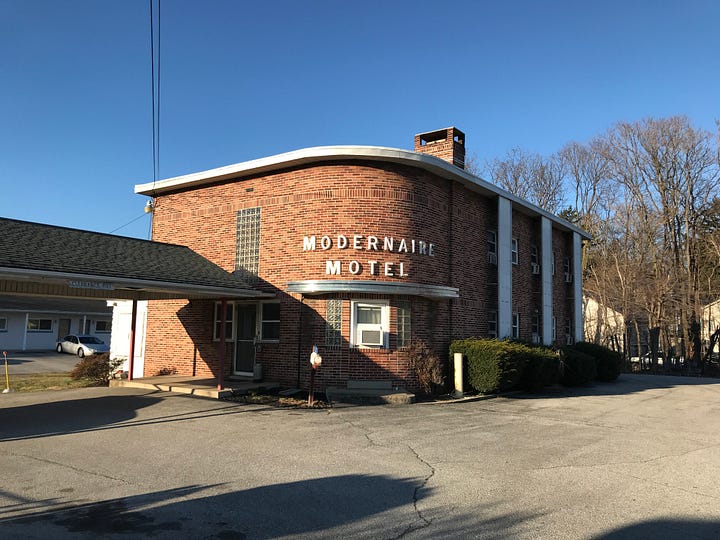
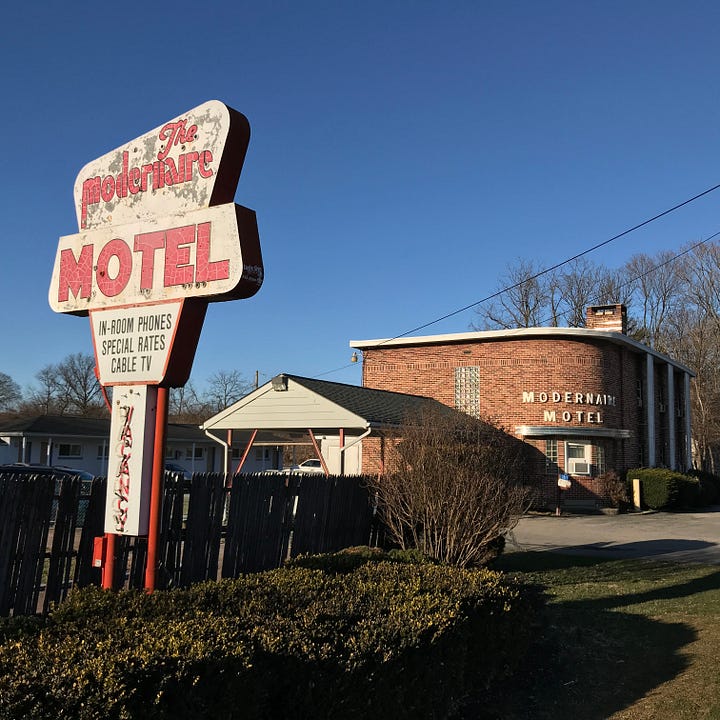
Lincoln Highway motel in Pennsylvania imperiled by development
Over on my Instagram, I think I’ve never posted photos of the Modernaire Motel, and if I did, it might have been a decade or so ago. But I’ve long admired the curves of the Art Moderne main building, and even its once-ratty sign, a cut-rate if charming shadow of its original neon self. (The sign has been spruced up since my last visit.)
The Modernaire has been a staple of the Lincoln Highway, in Springettsbury Township, Pennsylvania, near the city of York, since, by some accounts, its opening in May 1949. A less architecturally impressive expansion was built out in the back in subsequent years.
According to an account in the York Daily Record, the motel in its 1950s heyday attracted a mix of guests, from workers toiling in local industry jobs who would rent rooms a week at a time, to families exploring Pennsylvania Dutch country in the summer.
The Modernaire has been imperiled before by development, but it seems storms clouds are aggressively gathering this time.
According to the York Dispatch:
A new project called the Mount Zion Commons, advertised on commercial real estate broker Bennett Williams' website, has been proposed for Springettsbury Township in spring 2024. According to the broker, the project would call for the construction of 72,000 square feet of buildings, including "a national convenience store" that has not yet been publicly disclosed.
Wawa, the Pennsylvania-based convenience store chain that is undergoing a growth spurt, is reported to have set its sights on the property.
Losing the Modernaire would be a shame. If it comes to that, one can only hope the original sign can be preserved, and that the curved building with its glass block can be kept as part of the new development.
Stay tuned.
Notes From the Road
The New York Times has declared the Baby Blues Luncheonette in East Williamsburg, Brooklyn, as “a Greek diner for the 21st century.” Also, check out a profile of the innovative restaurant by Emma Orlow in Eater.
The Carnegie name continues to thrive in New York’s pastrami precincts, even if there’s no connection to the defunct deli by that moniker. The Carnegie Diner & Cafe is expanding to Times Square for its third location. [W42ndSt]
There’s a push to landmark the two remaining restaurants in Boston that were featured in the Green Book, which listed establishments that welcomed African-American travelers during the era of segregation. The last Green Book was published in the 1966-67 season. [WCVB]
The Empire Lounge & Restaurant in Louisville, Colorado, is closing after nearly two decades. It has a killer neon sign.
Watch this beautiful story about how a North Carolina sign painter who restores ghosts signs revived one that has deep meaning for an 86-year-old woman. The sign advertised her dad’s car dealership, and she takes great joy in knowing it will long be a “shrine” to him. It’s also a rare ghost sign featuring the long-defunct Hudson car brand.
Said to be a favorite of Frank Sinatra, the Twin Anchors Restaurant and Tavern in Chicago keeps it old school, right down to the Budweiser privilege sign still hanging outside. [Only In Your State]
The trend of opening new diners with an “old soul” is encouraging, and here’s an example in Ohio: The Governor in Milford. [Only In Your State]
The Fleur STL restaurant may no longer have the charming sign for its predecessor here in St. Louis, the Eat-Rite, but this reviewer is focused on what’s on the menu — and that’s better, Ian Froeb argues. [STL Today]
A location of Lee's Famous Recipe Chicken will be opening in the former home of Brownie’s Diner in Wayne, Michigan. Brownie’s closed back in 2010, and the building will be demolished. What will become of the sign? It was still there in August 2022, as captured in the above Google image. [Detroit Free Press]
“It breaks my heart that I’m gonna have to sell my parents’ legacy.” The owner of Glenpatrick’s Pub in Maspeth, Queens, is closing the family business. He says he was not able to recover from the effects of the pandemic. [QNS]
The Automat is long gone, the last closing on Manhattan’s East Side in 1991, but the idea of automated dining retains a perpetual appeal, as seen in the latest manifestation: The Brooklyn Dumpling Shop that’s opened in … Hoboken, New Jersey. [NJ.com]
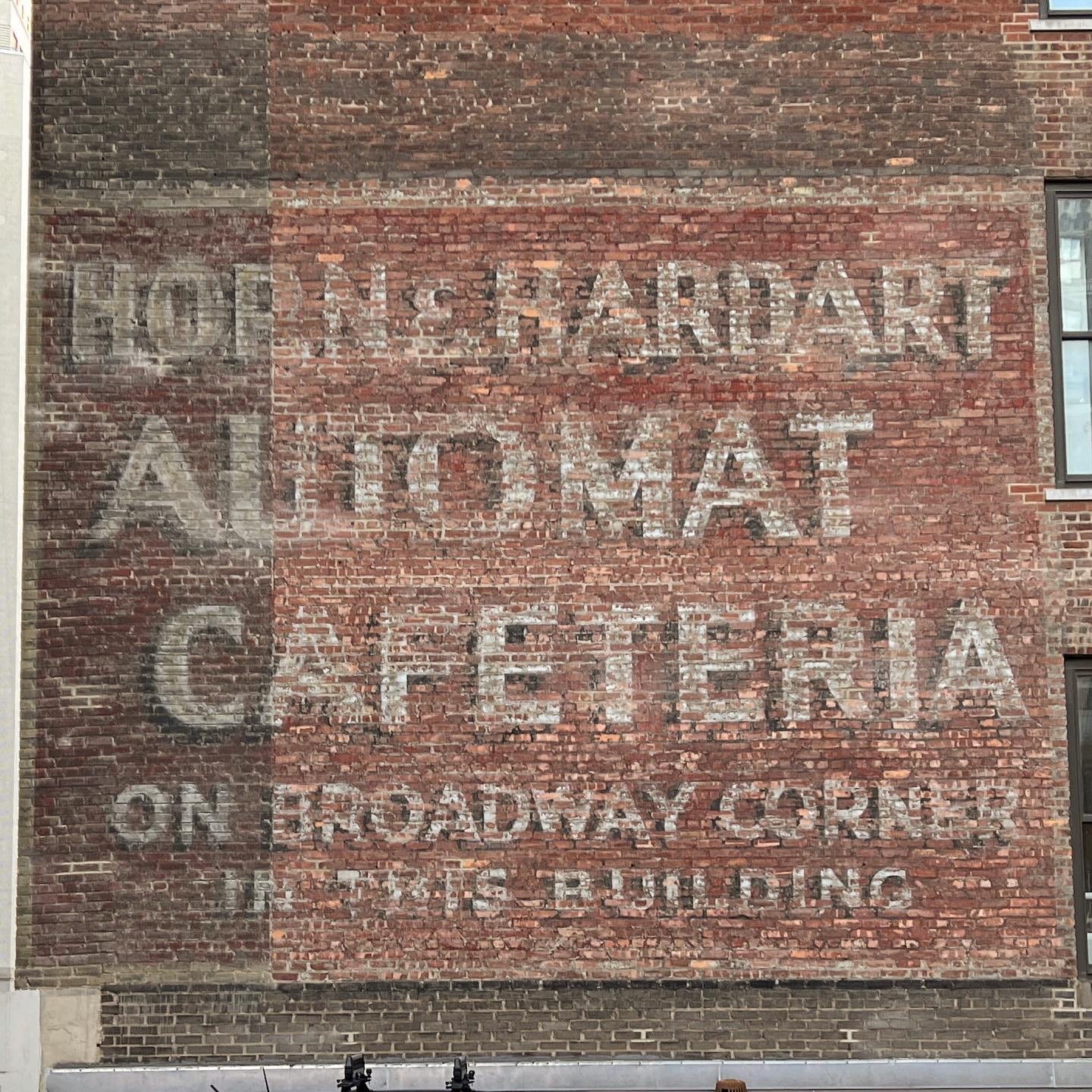
Traces of the original Automat survive, and one of my favorite examples is this ghost sign on West 38th Street in Manhattan. It can be spied from the sidewalk, but you can also take the elevator up to the rooftop parking garage and take a closer look for yourself. [MAP]
NOTE: Thanks for reading! I hope you can subscribe and even become a paying supporter! This is all a labor of love, but it’s an expensive one. Thanks!


